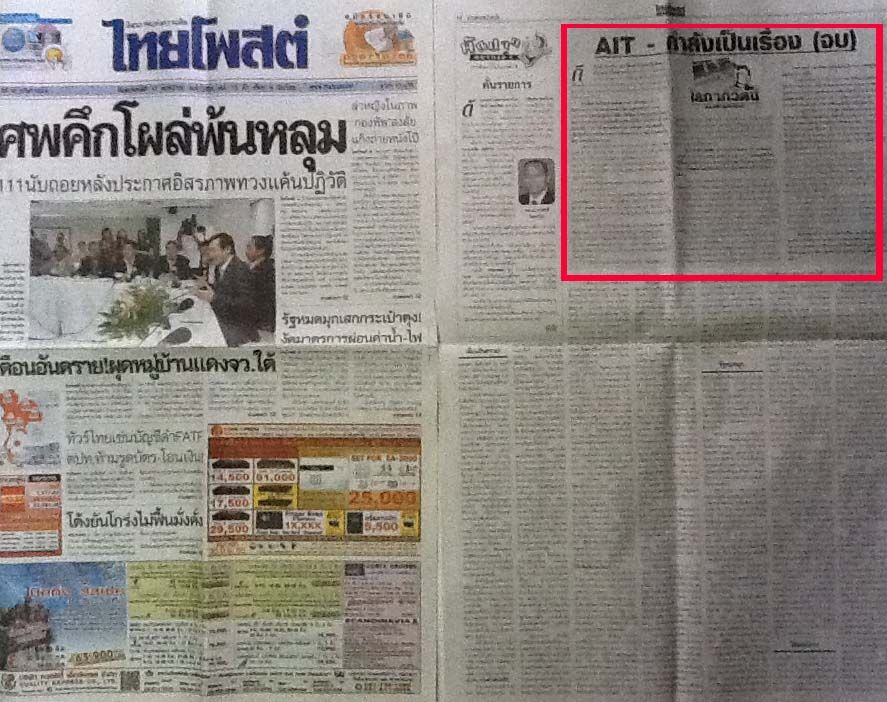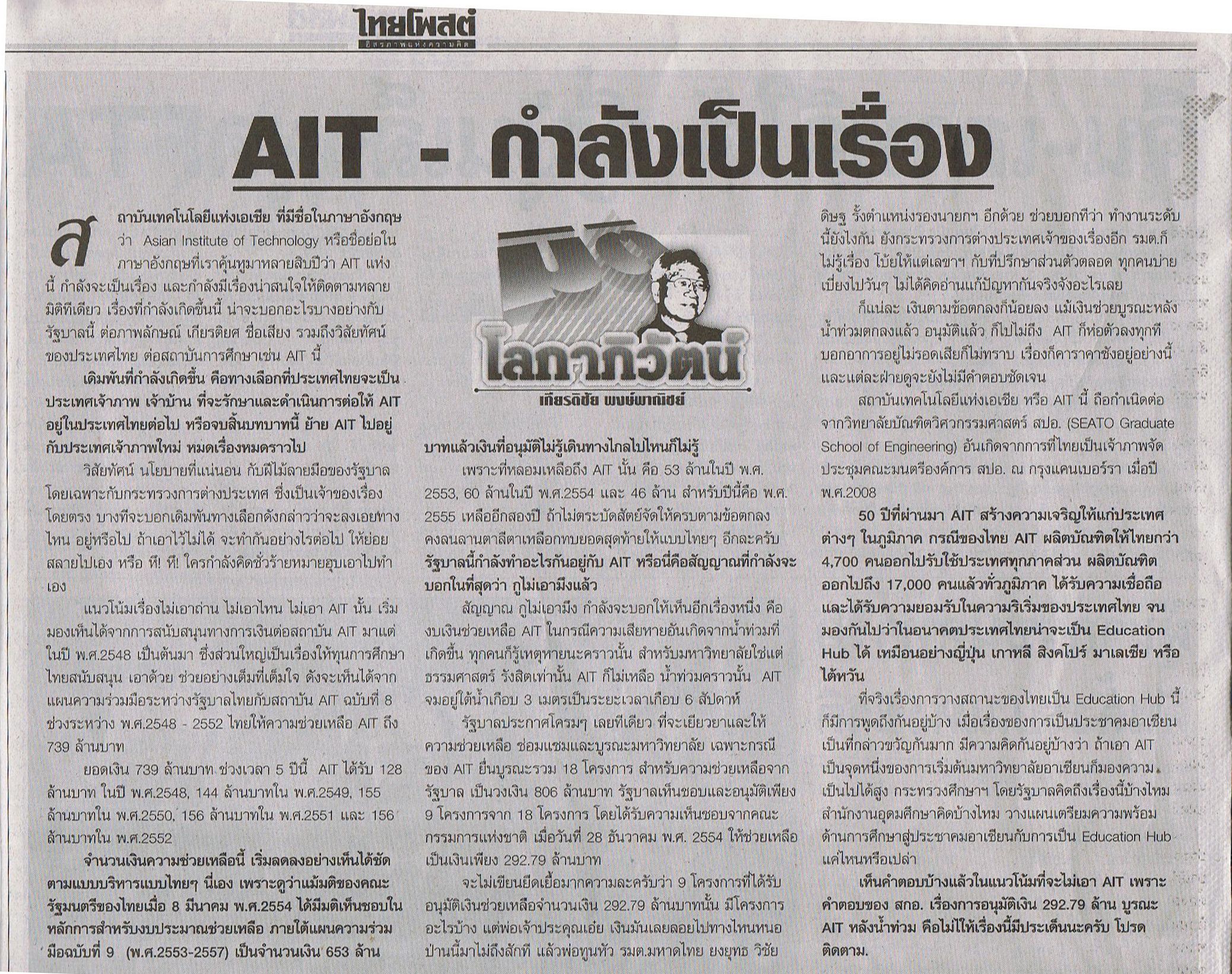
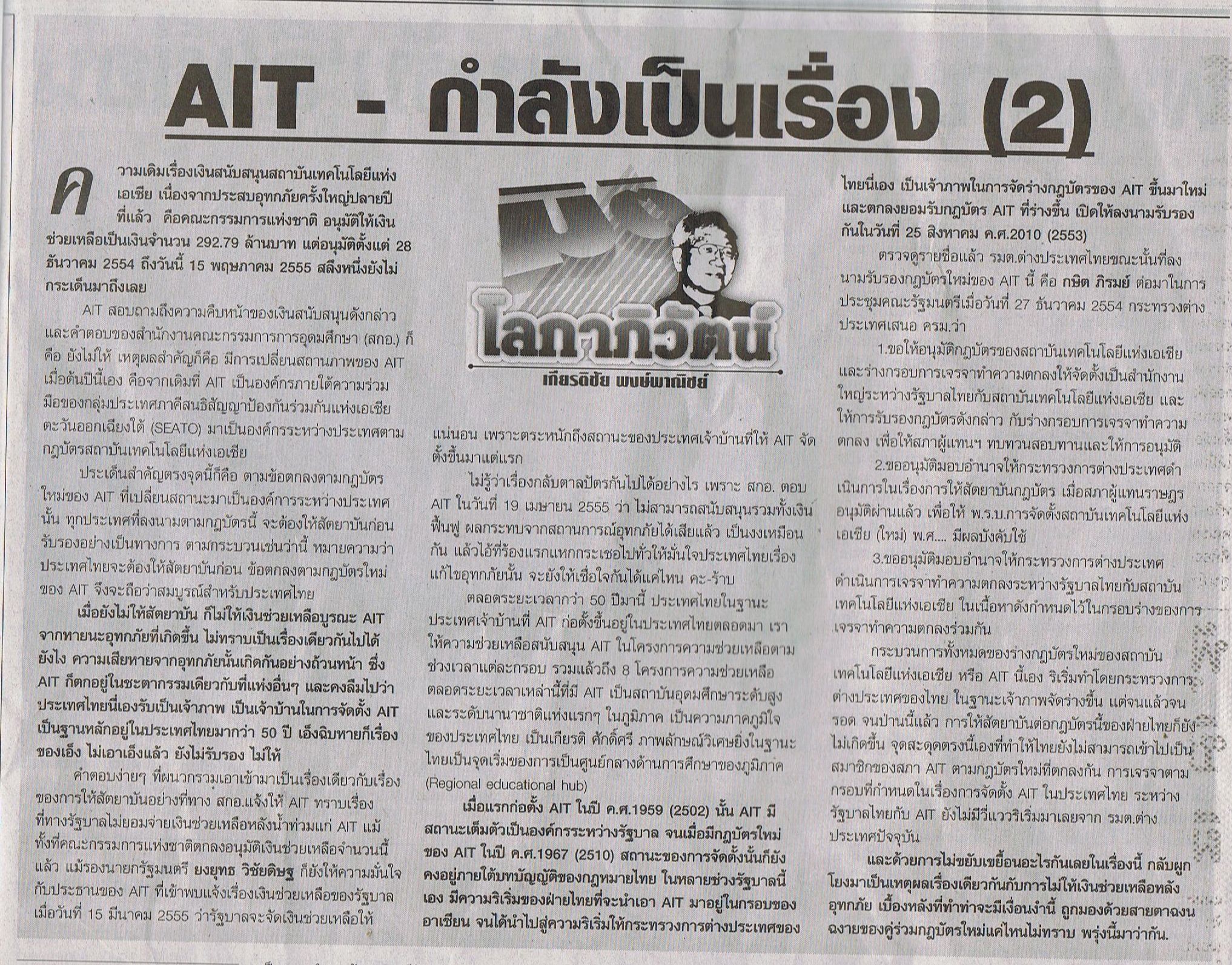
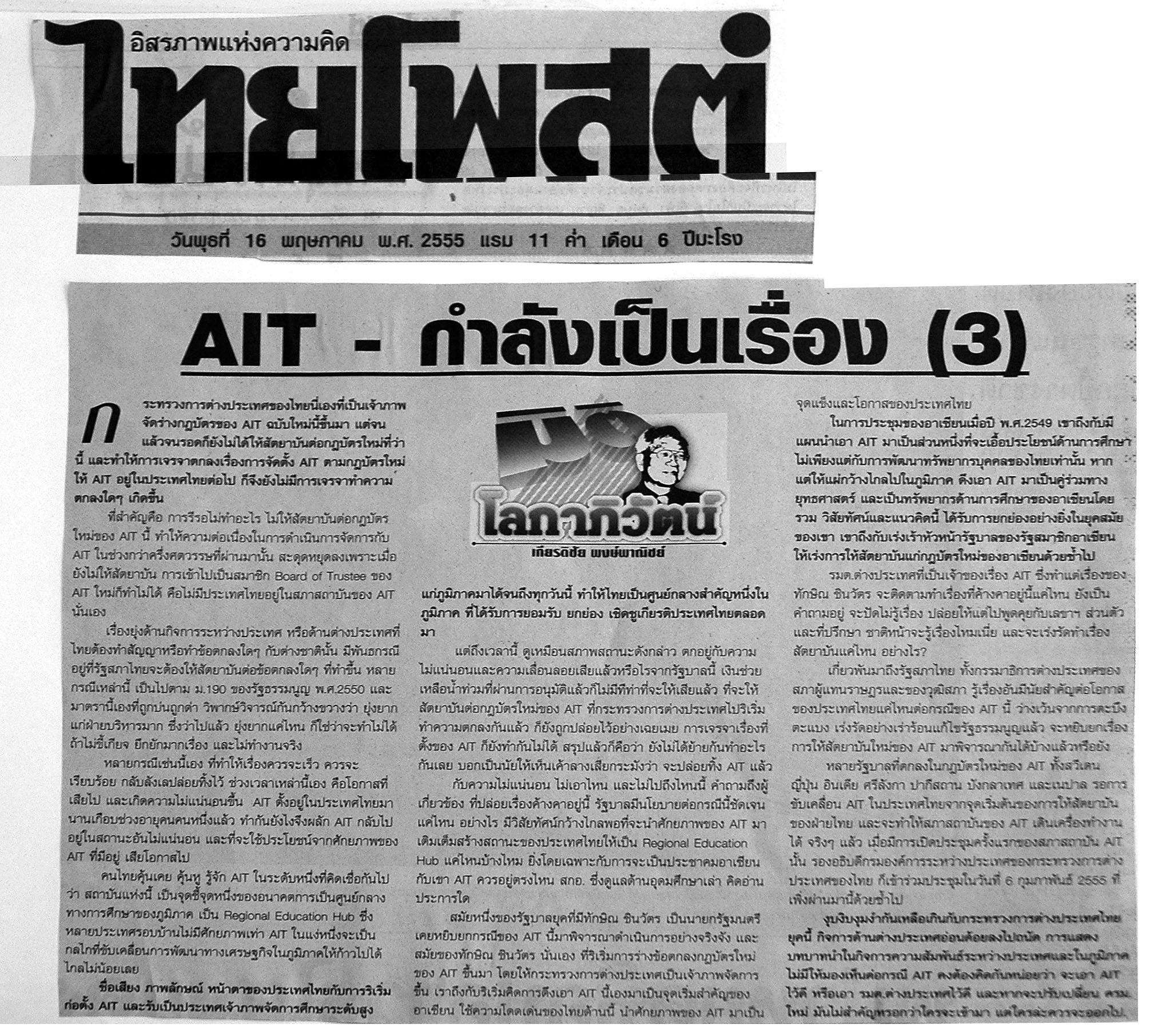
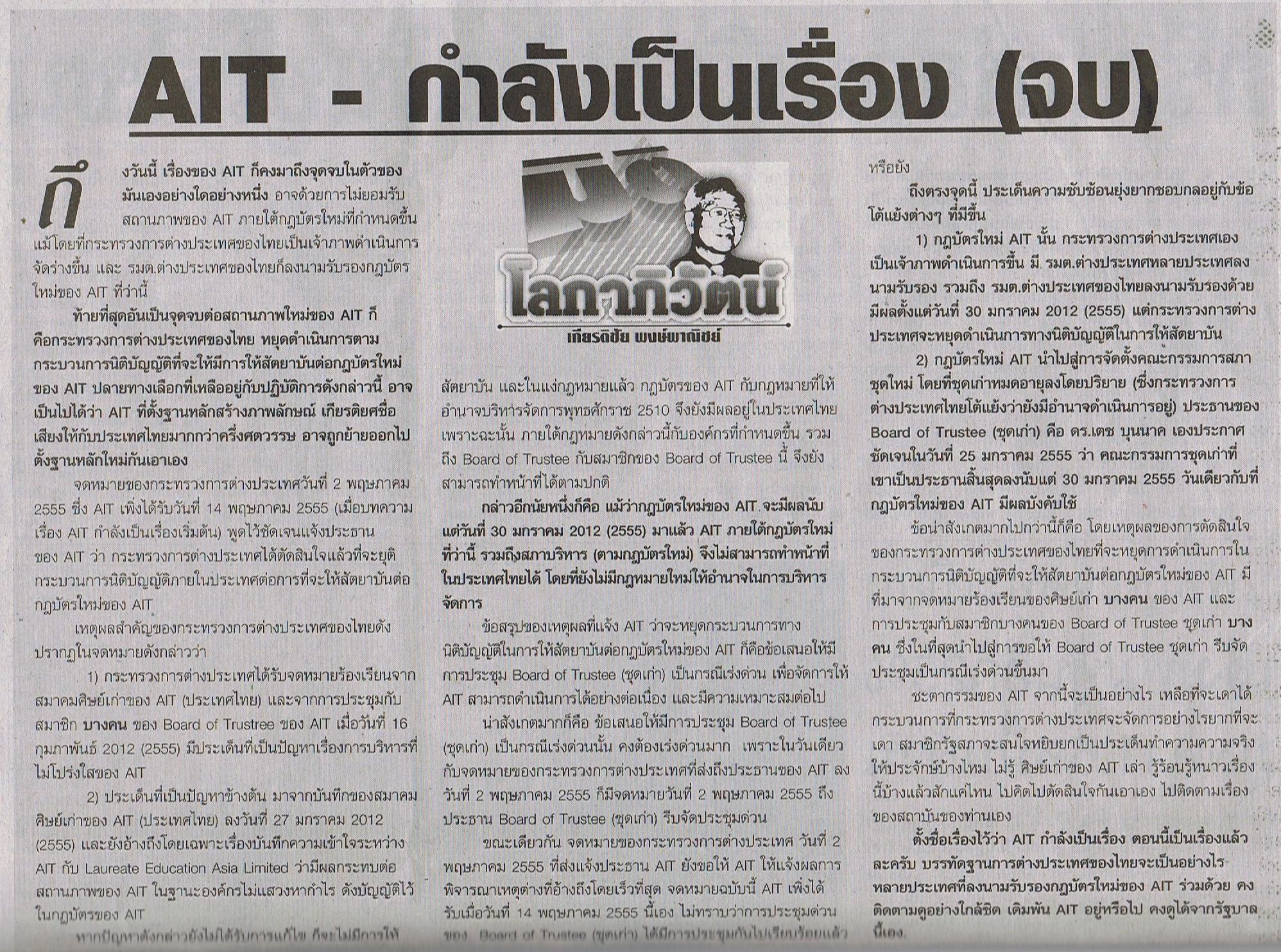
Dimension to Globalisation (I)
By Kiattichai Phongphanit
Translated by Mr. Nithinai Panich
Edited by Ms. Krishna Mawani
AIT – Getting into Troubles
Asian Institute of Technology (AIT), the institute with which we have
been familiar for many ten years is getting into trouble. And it’s an
interesting story worth keeping an eye on. The future effects regarding
this issue will give us insight of the government’s vision towards
AIT’s image, dignity and reputation as well as their vision for
Thailand.
We now are yet to see whether or not Thailand will remain the host to
keep AIT in the country. The issue to be determined is whether we
should end this role (as host) and move AIT to a new host
country—enabling the problem to be resolved once and for all.
The government’s vision, clear policy and skills, especially the
Ministry of Foreign Affairs who bears the direct responsibility, will
tell us how this problem will end and in which direction—whether AIT
remains in Thailand or not. Some things to wonder about are how will
they cope with this—or will they leave AIT to its condition? And is
somebody planning to take over the institution?
The current non-desirability for AIT can be seen in the government’s
financial support, starting from the year 2005. The government mostly
provides educational scholarships for which Thailand has given full
support as we can see from the cooperation plan between Thai government
and AIT institution, volume 8 from 2005 – 2009. Thailand has provided
AIT around 739 million baht as financial support. AIT received 128
million baht in 2005, 144 million baht in 2006, 155 million baht in
2007, 156 million baht in 2008 and 156 million baht in 2009, totaling
739 million baht in 5 years.
The financial support has noticeably decreased as we can see from the
Thai-style administration. Even though the Thai cabinet has approved
the support funds for AIT under the cooperation plan volume 9
(2010-2014) in the amount of 653 million baht on 8th March, 2011, the
approved funds took a long time to arrive.
AIT received only 53 million baht in 2010, 60 million baht in 2011,
and 46 million baht in 2012. As per the cooperation plan volume 9, the
government is to provide support funds for two more years. If the
government does not break their promise and make its full payment as
agreed, they might hurriedly pay the remaining sum in the last year
just like what the Thai government always does. One is forced to think
what is this government doing about AIT? Or this is a sign that they
are finally saying “I no longer want you”?
The sign “I no longer want you” is about to tell us another story,
regarding the flood relief funds for AIT. Everyone is aware of the
damage caused by the distaster. Thammasart (Rangsit) University wasn’t
the only university to be affected by the flood, AIT was also affected.
During the flooding situation, AIT was submerged under almost 3 meter
high water for about 6 weeks.
The government has stated that they will provide support and repair
for the universities. AIT has submitted their repair plan for 18
projects to receive government aid—a total of 806 million baht. The
government approved only 9 out of 18 projects for which the National
Board granted approval on 28th December 2011 for only 292.79 million
baht.
I won’t go into details what those 9 projects approved for 292.79
million baht funds consist of, however, I wonder where the money has
flown off to since it definitely hasn’t arrived as of yet to AIT.
Minister of the Interior and Deputy Prime Minister, Yongyuth Wichaidit,
please let us know how do you cope with this level of task? The
Minister of Foreign Affairs also doesn’t know anything and keeps
telling us to ask his secretariat and personal consultant. Everyone is
avoiding the topic; I don’t see any serious attempts to solve this
problem.
Of course, the funds as approved are much lower than the requested
amount. Even though the relief funds have been approved, it hasn’t yet
arrived. AIT is shrinking, showing signs that it may not be able to
survive. This issue remains pending and each party doesn’t seem to have
any clear answer.
Asian Institute of Technology was developed from SEATO Graduate School
of Engineering, which was established when Thailand was the host of the
SEATO Council Meeting at Canberra in 2008.
It has been over 50 years that AIT has generated wealth in many
countries in the region. In Thailand, AIT has produced over 4,700
graduates to serve in every sector of the nation and over 17,000
graduates throughout the region. AIT has gained trust and reputation in
Thailand and many think that Thailand could become an education hub as
is Japan, Korea, Singapore, Malaysia and Taiwan.
In fact, the position of Thailand as an education hub has received
some attention. When the ASEAN Community has been in the main focus,
the government should think about turning AIT as a start for ASEAN
University with high potential. Has the Ministry of Education under
this government ever thought about this? Has the OHEC had any idea? How
far will Thailand prepare to become an education hub in the ASEAN
Community?
We can see the signs that they no longer want AIT, as shown from the
OHEC’s answer of approving only 292.79 million baht for AIT restoration
(following the flood). It is obvious that the government no longer
wants to keep AIT in Thailand. This becomes an issue. Please follow me.
AIT – Getting into Troubles (2)
By Kiattichai Phongphanit
Translated by Mr. Nithinai Panich
Edited by Ms. Krishna Mawani
Asian Institute of Technology (AIT) was approved aid funds of 292.79
million baht by National Board for the damage caused by the mass flood
that occurred at the end of last year. The approval was made on 28th
December, 2011 and until today 15th May, 2012, they haven’t received a
single buck.
AIT inquired about the progress of the aid funds and the Office of the
Higher Education Commission (OHEC) said that they wouldn’t grant the
funds for now. The main reason is that the status of AIT has been
changed in the beginning of this year. Previously, AIT was an
organization under the cooperation of country members of the South East
Asia Treaty Organization (SEATO). It has now been changed to an
international organization as per the Asian Institute of Technology’s
charter.
The main point is that, according to the agreements under AIT’s new
charter which changes its status to an international organization, each
and every country signing under this charter will have to give their
vow before they receive a formal accreditation. This means that
Thailand will have to give their vow, so that the agreements in AIT’s
new charter become valid in Thailand.
Because Thailand hasn’t made a vow, yet, no flood relief funds for AIT
will be provided. I don’t know how these two things can be related. We
all have been affected by the flood, and AIT has been in the same
situation just like any other institution. They probably have forgotten
that Thailand accepted to be host for the AIT
establishment, which has now been settled in Thailand for more than 50
years. “When you’re in troubles, it’s your business. I no longer want
you. I won’t accredit you. I won’t give a s***.”
The answer is very simple—Thailand is to give its vow. Even though the
National Board has approved the funds, OHEC has informed AIT that the
government refuses to pay AIT the flood relief funds because Thailand
has not made its vow yet. On 15th March 2012, Deputy Prime Minister
Yongyuth Wichaidit even assured AIT Chairman when he met the cabinet
regarding the relief funds that government would definitely arrange the
funds for them, as he realized the status of Thailand as the host
country supporting the AIT establishment from the start.
I don’t know what will turn of this issue; OHEC replied to AIT on
April 19th 2012 that they can’t provide the support or flood relief
funds. It’s surprising! How are we supposed to trust their big
announcement throughout the kingdom regarding their flood management
now?
Thailand has been the host country for AIT for 50 years. We have
provided AIT support in total of 8 support projects in each timeframe.
Throughout the time, AIT has established itself as a high-level
educational institute and one of the first international universities
in the region. This adds pride, dignity and image for Thailand as the
first regional educational hub.
When AIT was first established in 1959, it was an entirely government
organization. When the AIT’s new charter was launched in 1967, its
establishment status remained under the law of Thailand. In this
government, Thailand has an initiation to bring AIT into the ASEAN
frame and thus, the Ministry of Foreign Affairs of Thailand decided to
be a host to draft a new new AIT charter. They agreed to accept AIT’s
new charter and signed in accreditation on 25th August, 2010.
The Minister of Foreign Affairs who signed in accreditation of AITs
new charter was Kasit Phirom. In the cabinet meeting on 27th December,
2011, the Minister of Foreign Affairs proposed the following:
1. Approve the charter of Asian Institute of Technology, draft the
framework for negotiation to establish a headquarter in cooperation of
Thai Government and Asian Institute of Technology, accredit the
mentioned charter and draft the Memo of Understanding for the House of
Representatives to review and approve.
2. Empower the Ministry of Foreign Affairs to make a vow when the
House of Representatives grants approval so that the Act of Asian
Institute of Technology Establishment (new) of the year…… becomes
effective.
3. Approve and empower the Ministry of Foreign Affairs to negotiate
and reach understanding between Thai Government and Asian Institute of
Technology regarding the contents set forth in the negotiation
framework.
The entire process of drafting Asian Institute of Technology or AIT’s
new charter was initiated by Ministry of Foreign Affairs of Thailand as
the host country. However, Thailand has not made a vow for this
charter. This deadlock has prevented Thailand from becoming a member of
AIT Council as per the agreed new charter. The negotiation under the
framework of AIT establishment in Thailand between the Thai Government
and AIT has no sign to get started from the present Minister of Foreign
Affairs.
No movement in this regard has been connected to the reason of not
providing AIT flood relief funds. It seems to have some clues behind
this issue. The member of the new charter might view this with
curiosity. Let’s talk about this tomorrow.
AIT – Getting into Troubles (3)
By Kiattichai Phongphanit
Translated by Mr. Nithinai Panich
Edited by Ms. Krishna Mawani
The Ministry of Foreign Affairs of Thailand was the host to draft AIT’s
new charter. However, they have not made a vow for this new charter so
far. Thus, the negotiation on AIT foundation according to this new
charter is stalled as no negotiations have been arranged whatsoever.
The failure of the Thai government to proceed and make a vow to AIT’s
new charter has caused a pause for AIT’s management, which has been
continuing for over a half century. The lack of a vow makes it
impossible to become a member of AIT’s new Board of Trustees. This
means Thailand has not been listed in the AIT Council.
The law states that whenever Thailand enter or engages in an agreement
with a foreign country, The Thai Parliament is required to make a vow
for the drafted agreement. In many cases, this complies with Section
190 of the 2007 Constitution. This section has been widely criticized
that it causes a great difficulty for management. However, regardless
of the difficulty level, it can achieved if there are diligent,
hard-working people.
Many issues that should have been quickly finalized are left
incomplete. This period of time is an opportunity lost and has caused
uncertainty. AIT has been established in Thailand for almost a
generation. Naturally, one wonders why did the Thai government push AIT
back to an uncertain state? The opportunity to gain benefits from AIT
has been lost because of this.
AIT is considered to be possible Regional Education Hub, as many of our
neighboring countries’ capacity is not comparable to AIT. In addition,
AIT will be a mechanism to drive the economical development in the
region.
The reputation and image of Thailand as the founder of AIT and the host
of high-level education in the region has enabled Thailand to be one of
the most important centers in the region with constant recognition,
praise and admiration.
However, AIT’s current status seems unclear and uncertain under the
administration of the existing government. The approved flood aid has
shown no signs to arrive in the hands of AIT. The required vow to AIT’s
new charter as initiated and agreed by the MFA has been ignored and
left behind. The negotiation on AIT’s location has not yet been
arranged. The government clearly is doing absolutely nothing. Are we to
take this as a hint that they about to abandon AIT?
With uncertainty, incompetency and failure to make progress, a question
to those involved that are supposed
resolve this issue: how clear is the government’s policy for this
issue? Is their vision of the future good enough to employ AIT’s
capability to establish Thailand as a Regional Education Hub?
Particularly, when the ASEAN Community is introduced, where will AIT
belong to? What opinion does the OHEC (the ones responsible for
university education) have about this?
During the cabinet of Thaksin Shinawatra as a Prime Minister, the AIT
issue was raised for serious consideration. It was in his governance
that the initiation was introduced to draft AIT’s new charter and
agreement with the Ministry of Foreign Affairs as a host. They even had
an idea to use the AIT foundation as a start point for ASEAN and employ
Thailand’s distinguishing features in this field and AIT’s capacity as
a strength and opportunity for Thailand.
At the 2006 ASEAN meeting, they planned to employ AIT as a part to
facilitate the education, not only for Thai human resources
development, but throughout the region. AIT was integrated in the
strategic partnership and became an educational resource for ASEAN.
This vision and concept received a great admiration during his
governance. He even urged the government leaders of ASEAN members to
take a vow for ASEAN new charter.
How far will the Minister of Foreign Affairs, who’s responsible for the
AIT issue and does things only for Thaksin Shinawatra, avoid this
unsolved problem? This continues to be an important question, as he
keeps avoiding this question and asks us to instead discuss this with
his personal secretariat and consultant. Are we ever to get an answer,
preferably in this life? How fast will he rush the making of vow? And
how?
With the Thai Parliament involved, will the Board of Commissioner,
House of Representatives and Senate ever become aware of this
significant opportunity for Thailand? Apart from the hot issue of
constitutional amendment, will they ever raise the issue of making a
new vow for AIT?
Governments of many countries who have signed in agreement of AIT’s new
charter, including Sweden, Japan, India, Sri Lanka, Pakistan,
Bangladesh and Nepal are waiting for Thailand’s movement towards AIT.
In fact, in the first meeting of AIT institutional council on February
6th, 2012, Deputy Director of International Organization of Thai
Ministry of Foreign Affairs even participated in the meeting.
The Ministry of Foreign Affairs of Thailand has hidden a lot from us.
The current performance of foreign relations has become noticeably
weaker. There are no international and regional relations towards the
AIT situation. So, we have to think if we are going to keep AIT or the
Minister of Foreign Affairs. If the cabinet reform is about to take
place, it will does not matter who will get the position, but it does
matter who leaves.
AIT – Getting into Troubles (IV)
By Kiattichai Phongphanit
Translated by Mr. Nithinai Panich
Edited by Ms. Krishna Mawani
Until today, the AIT issue might have reached a certain ending point of
its own. Even though the Ministry of Foreign Affairs of Thailand was
the host to draft the new agreement and the Minister of Foreign Affairs
had signed in approval to certify this AIT’s new charter, Thailand has
still not accepted the status of AIT under this new charter.
Thailand has stopped the legalization process to ratify AIT’s new
charter. This will most likely cause AIT, which has been established
here in Thailand and generated the reputation and dignity for Thailand
for over a half century, to be removed and established somewhere else.
The key reasons of the actions of the Ministry of Foreign Affairs as
indicated in the letter:
1) The Ministry of Foreign Affairs has received complaint letters from
AIT alumni (Thailand) and a meeting with some members of AIT Board of
Trustees, which was held on 16th February, 2012, regarding transparency
of AIT administration.
2) The problematic issue above is a result from a memorandum sent from
AIT alumni (Thailand) dated 27th January, 2012. The memorandum of
understanding between AIT and Laureate Education Asia Limited has been
referred to that it has an impact on AIT’s status as a NGO as specified
in the AIT charter.
If the said problem remains unresolved, no ratification would be made.
In the legal sense, the AIT charter and the law granting administrative
authority of 1967 remains effective in Thailand. Thus, under this law,
the members of Board of Trustee remain operable as normal.
In other words, even though AIT’s new charter has become effective
since 30th January, 2012, AIT and Administrative Council (under this
new charter) have not been able to function in Thailand. This is
because there is no new law granting them the administrative
authority.
In conclusion, the reason they informed AIT of the intention to stop
the legalization process to ratify AIT’s new charter is that they
proposed that the meeting of (previous) Board of Trustees be held
urgently to enable AIT’s ongoing and suitable operation in the
future.
Some things worth noticing: the proposal of the meeting of (previous)
Board of Trustee must be very urgent, as the letter from Ministry of
Foreign Affairs to AIT President has been dated 2nd May, 2012 and the
letter to the Chairman of (previous) Board of Trustee for urgent
meeting has also been dated 2nd May, 2012. In the meantime, a letter
from Ministry of Foreign Affairs dated 2nd May, 2012 sent to the AIT
President asked AIT to report the consideration results as soon as
possible. AIT has received this letter on 14th May, 2012. AIT was also
unaware if the urgent meeting of (previous) Board of Trustee had been
held.
At this point, the complexity lies in many arguments that have been
raised.
1) AIT’s new charter has been drafted by Ministry of Foreign Affairs,
which has been signed in approval by the Ministers of Foreign Affairs
of several countries, including the Thai Minister of Foreign Affairs.
This charter has become effective as of 30th January, 2012. However,
the Ministry of Foreign Affairs has stopped the legalization process to
ratify.
2) AIT’s new charter has led to the formation of new Council Board of
Committee and the former Board has by implication become expired (even
though Thai Ministry of Foreign Affairs has argued that the former
Board remained in power). On 25th January, 2012, the chairman of the
(previous) Board of Trustees, Dr. Thet Boonnak has clearly announced
that his former Board for which he was a president became expired as of
30th January, 2012, the same day when AIT’s new charter became
effective.
Interestingly, the reason that led to the decision of Ministry of
Foreign to stop the legalization process to ratify AIT’s new charter
has stemmed from the complaint letters from some AIT alumni and the
meeting with some members of previous Board of Trustees. Finally, this
led to the request of an urgent meeting held by the previous Board of
Trustees.
What AIT’s fate will be from here can only be guessed. The steps that
the Ministry of Foreign will take are also hard to guess. Are the
Members of Congress interested to raise this issue and resolve it? How
will the AIT alumni feel about this? This is what you have to think and
make a decision on your own. You will need to follow closely the issues
of your own institution. I have named this article “AIT – Getting into
Troubles”, because AIT is neck-deep into troubles now. What will be the
norm for Thai foreign affairs? Several countries who have signed in
approval of AIT’s new charter are keeping their eyes on this. Is AIT
here to stay or go away? Only future action from the Thai government
can tell us.

